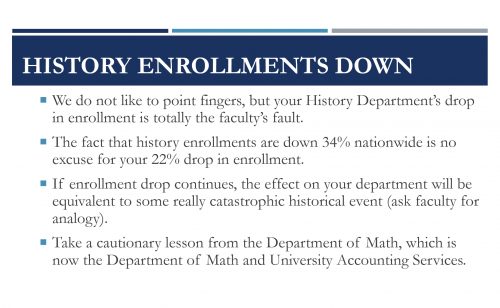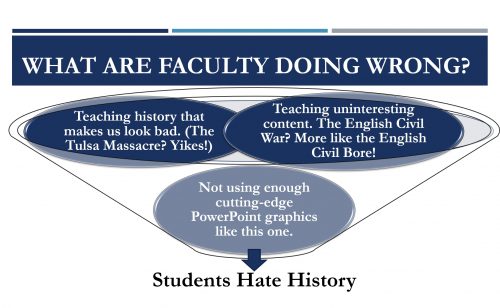It’s true. It’s never the administration’s fault, always the faculty.
That last line is too true. I suspect many mathematics professors feel that their discipline has been relegated to working as a service that gives basic training to the “sexier”, more popular majors, like chemistry, biology, and computer science. I hope this satire doesn’t give any administration the idea of merging math with accounting to save money. Quick, let them know that the mathematicians are all playing around with Greek letters and don’t know anything about arithmetic!
Oh, wait, let’s not forget, McSweeney’s is poking fun at the dismissal of history.
That is all correct. The Tulsa Massacre is depressing, and the English Civil Wars? Go ahead, ask any American who won it, and they won’t have a clue. They won’t even be able to name which side was which.
I have suddenly realized that the PowerPoint slides I use for genetics are also incredibly bland. Am I going to have to worry about my job? Please don’t merge biology with health services!




Hmm. Maybe they could merge the mathematics and classics departments?
There is an interesting series of articles in this week’s Science about how physics departments reversed a decade of declining student interest in physics while at the same time utterly fucking up any progress on increasing diversity in the field, particularly among black students. To this day, the majority of black physics majors come from HBCU–it’s a pretty damning indictment. Even very smart people have a hard time understanding that “we all do better when we ALL do better.”
Well, they are right about biology being sexy.
Or perhaps the mathematics departments could make themselves useful by providing statistical compilation and analysis for the athletic departments. Those analytics are a big part of sports these days, and it’s about time math and science started pulling their own weight in this world. Then we can truly have universities that our football teams can be proud of.
As a music major back in the 1980s, I was always glad I didn’t play clarinet or tuba or any of those “band instruments.” Music majors who played those instruments were all required to play in the marching band. I hate marching bands. As it was, one of the choirs I sang in got roped into singing the national anthem before a couple of basketball games. That was actually fun, although not enough to allow me to stay and watch the ensuing game for free. I fully intend to carry this bitterness with me for the rest of my life.
Since virtually all academic terminology comes from Latin or Greek, we could quite easily merge everything with the Classics department. Bow before your tweedy, bespectacled overlords!
Hey now, just because American schools don’t teach English history doesn’t mean we don’t know about Charles I, and that the royalist faction lost. Puritans, Oliver Cromwell etc….
Thanks to Time Team for filling in the gaps.
What’s so “cutting-edge” about that PowerPoint? It’s all text. The text is broken up into some sort of pesudo-Venn oval structure that doesn’t actually mean anything.
Uh, that’s the joke.
Merging the Biology department with health services opens up interesting possibilities for your labs experiments.
… merging math with accounting …
Such optimism.
Mathematicians will have to earn their keep by focusing their skills on the applied science of astrology!
Biologists will have to do the same with homeopathy…
@6 Time Team?! Surely you mean Horrible Histories!
I haven’t used PowerPoint in years, or any part of the Microsoft Office suite. This is off topic, but it’s a rare case where I miss Microsoft. Everywhere I work relies on Google docs, which are free, in the cloud, and “almost there” in terms of features, but basically suck. They are just adequate and will never be improved (except possibly in terms of collaboration and sharing, which is the big focus, not feature set).
The last time I was presenting at conferences, it was the norm to prepare overhead transparencies. I would laserprint SliTeX and go to a Kinkos to copy to transparency (believe me you wouldn’t want to see my handwriting). Anyway, it was a pain and I didn’t prepare well. The one good thing I will say about presentation software is that it’s a lot easier than the above. Of course, people expect more slide junk. On balance, I think I may have been less discouraged about presentation and teaching way back when if I could have don’t it all in software though (you don’t want to see my whiteboarding either!).
PZ@1
Euclid’s Elements is a classic by any standard.
PaulBC, Newton’s Principia is also a classic, but nobody reads it.
The last English Civil War began in the 1770s and lasted into the 1780s, with the side that rebelled to keep their African slaves winning.
snarkrates@14 Until fairly recently (historically speaking) Euclid’s Elements was used directly for teaching. I admit it’s not how I learned geometry, but it probably tallied up a lot more readership than Newton’s Principia.
Anyway, my attempt at levity was that Euclid could reasonably be studied by classicists and he also wrote a classic work of mathematics.
We mathematicians have already solved this problem… don’t use powerpoint!
We use, in order of preference:
– Blackboard and chalk
– Whiteboard and markers
– LaTeX slides
So, nobody can use your powerpoints against you, and if anyone tries to frame an argument against you using a powerpoint you can simply state it’s an inferior method of bringing the point across.
Well, there is an upside. Low to now math, no new nukes. Those are nothing but math based.
I know you were making a joke (as well as a decent point) but it’s wrong to say that mathematicians know nothing about arithmetic. They know plenty but typically don’t bother to develop any skill in its use, beyond the ordinary. That said, there are few fields in math where you can succeed while being truly bad at arithmetic. Careless, perhaps, but not bad.
@robert79 – so true. Except we don’t have any blackboards left (chalk makes me sneeze, so I’m happy about that one), and my university bans whiteboards because the automatic lecture recording thing doesn’t record them (though we did get away with it sometimes pre-covid), so we now use the digital method – and iPad with an iPad pen that gets shown to the whole room.
This all goes a little close to home, as our faculty made big cuts last year. The Maths & Stats department does the most teaching of anyone, and really we don’t have enough people to do all our teaching, but our research got ranked lowest in the faculty because the amount of research grant money is low – because maths research doesn’t usually need millions of dollars for equipment! Luckily we got something of a reprieve, but we’ve still lost several people to voluntary redundancy and are working harder than ever.
Mathematician here: yes, there is definitely a push from many administrators (not to mention politicians) who view mathematics education as something only used to train engineers.
At the beginning of this semester, I had a student in my multivariable calculus course email me and ask “I’m a chemical engineering major, and I’m taking your class because it’s required for my major. What is the use of multivariable calculus in chemical engineering?”
I told them that I’m not an engineer, and he should ask his chemical engineering professors questions about chemical engineering. I can only tell you how multivariable calculus is useful in geometric topology: not in other fields of study.
I don’t mind it when a student asks me that sort of question: asking questions can help you learn even if the person you’re asking doesn’t know the answer. I DO mind when someone
a)Believes they have nothing left to learn,
b)Believes that only one or two subjects are worth study (probably whatever they think leads to the highest salaries), and
c)Are almost completely ignorant of the subjects they dismiss.
It’s unfortunate when anyone falls into this trap, but it’s particularly unfortunate when it’s someone with considerable authority or influence.
183231bcb@21 A bit tangential, but my gut reaction as a computer scientist with a little math and no chemical engineering at all is that at least some chemical engineers must make heavy use of multivariable differential equations (or at least be able to understand them well enough to set up a computer simulation). Chemistry involves time-dependent processes. As an engineer, you are going to want very precise answers on yield, temperature range, etc. How are you supposed to do that if you don’t know calculus?
And a Google search suggests that MAA (perhaps a little biased) backs me up on this:
I had a required calculus sequence as an undergrad in CS. Personally, I enjoyed it, but I haven’t used it much either in research in grad school or later in industry. Still… sometimes. But it seems obviously applicable to engineering.
Granted, I don’t know your exact curriculum. If it’s on the theoretical side, it could be hard for students to make the connection.
Well, you can express a hunch. You can also suggest doing a quick search as I did.
183231bcb, Good grief! All physical chemistry is is multivariate calculus! It’s all about how reactions come to equilibrium as a function of pressure, temperature and chemical potential. It’s astounding that a Chem. E. student wouldn’t understand that.
183231bcb:
At least you (apparently) have engineers to train. At my Small Private Research University of Last Employment, only scientists (and the biologists really, really don’t care if their students learn calculus). We did participate formally in several larger-and-distant universities’ 3-2 programs (where students study 3 years at a university without engineering courses, taking mathematics and science courses that purportedly prepare them for two further years at a university that does have them). We never had more than 3 students a year in the program.
Another geometric topologist! And, yes it is; so is some complex analysis, which is how I got into the business.